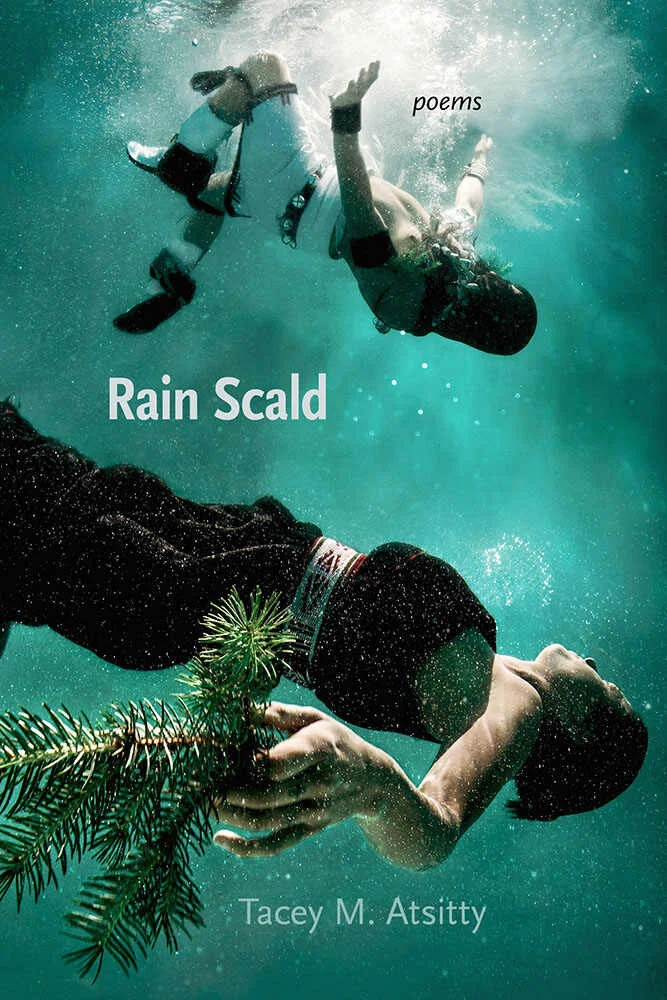Tacey M. Atsitty
Poetry
Elegy for Yucca Fruit Woman
Without me, she said. Go—
I’m going to the rock
that once had wings. My life
rolls like rock clods
down a volcanic throat. Circle
the tips of big winds beneath
~
poised arms wing bone,
surrounded & closing,
dust hinge. In upstroke, a slow
separate in landing then take off. To take
air, those inward whooshes as if blessing
oneself. That sound of marrow leaving
the hollow.
~
pop. This woman knelt with women,
filling the earth: mush in tin
after tin, filled in with the breaking
sun. Kneeling down, she’d flap
dough at the wood pop,
her hands whirring. The air
bubbles rising with heat ready to—
Later she’d send me to 7-2-11
clenching quarters for—
~
at two points: they say a man flew
with a life feather, quill in hand
from the top of Shiprock, down
to the people, having slain
monster birds. Plumes
and all their vanes ending
in flight, humming after bird strike
~
A female eagle swooped east,
she once told me. It was like gold
whirring in the blue of my wind-
shield. I was in my truck, driving
and listening to Peyote songs
when it happened. I had never seen
so much dust.
~
When skin slats, layered
like stone then collapses—
a red grows gray. Aspen expands
to the hush
of this cedar-filled room. When
her neck grew heavy, she said,
The music helps me. Press play:
Hei hei ya wena hei nei, Hei hei ya wena hei nei;
Hei hei ya wena hei nei, nei; Hei hei ya wena hei nei;
Ya na hei ya na hei o weno hei nei;
Ya na hei ya na hei o weno hwoi na hei nei yo wei.
Mandala Journal – “Elegy for Yucca Fruit Woman” (Issue X; May 2014)
Leaping Ridge
The Crescent tells of a night that once poured
pale tiles in the sky. Like a pail tilt—
whoosh! Night blooms from Spanish Dagger, sores
of water in ash. There is no smoke spilt
or stitches stacked along the fibers: land to blue.
Wall where water carves a tear, a wilted
pluck or flower canal. Gourd-full spew
at the tongue. This is how a sheer quilt
freezes you in patch, in dune. Smother. Rock-
fold once cradled a mother in the hilt,
dipped her in descent. Yucca curl. Last gawk
went in search of her back, where after the jolt
her infant swayed: at every crumble of limb and mud,
such a small thud, thud, thud.
Perspectives – “Leaping Ridge” (2011)
Sunbeam
Around noontime on Highway 666, they are driving to Gallup. It is Pepper’s fifth birthday. My dad is working in Red Valley. Cloudless. He is probably running laps with students. Our two vehicles leave the Chuskas. I want a sucker. Cheii takes me. My little brother, Vince, and baby sister, Billie, are with mom, Pepper, Shelley Dee, and Aunt Vicky in her car. It is too bright today. Two weeks ago my mom dreamt of night birds chanting amidst juniper berries. Today, the land formations look like owls——Mom was smiling in the passenger seat, Billie in her arms. I walk out of the Little Water Trading Post with Minnie Mouse’s heart in my mouth. Cousin Shelley Dee was singing, “Jesus Wants Me for a Sunbeam” with my older sister Pepper. I sit alone, in the back of my Cheii’s truck, spreading rouge across my eyelids. Vince sips his root beer and Billie sleeps. It was May. I don’t understand the dream or the land—Grandma clenches my hand as we stand on the side of the road in Newcomb, watching the sun take them:
pepper-grass gathered in a pink plastic cup, here Daddy.
Essays on American Indians & Mormon History - "Sunbeam" (University of Utah Press 2019)
Monster Who Kicks People Down the Cliff
All night we sat and he told me how once his mother had ridden a mare to death. He doesn’t usually do so: sit. Usually, it’s just a kick in the pants and all is gone to plummet, but tonight the sky emits a loneliness that only a monster could know. In a vale of cottonwoods, he started. There was a river where my mother would sit. And she bent her back for stones that looked like half of me. I remember settling like a rock inside her belly as she rode bareback at the edge of the river, regretting how she waited for the sun to warm the cliffs. Regretting the glint of her husband’s eyes at her longing— I’ve seen her clamber and wail when she went off to be with canyon walls! Later, she’d rock me to sleep: O wei o na o wei o naa, o wei o na o wei o na’oho, o wei o nei o naa o wei o wei naa. And as she went riding over, I can’t tell you how the sky shot me to pieces. How my insides lay like a wet mane over river rocks. I never saw the horse again. And now, my mother’s people know nothing but to skid me across water into the walls below. Your people, he finished and stood up:
When you pile the night as long as I have,
and wait for walls to sink then rise into sun,
you can never know morning like this—
Mandala Journal – “Monster Who Kicks People Down the Cliff” (Issue X; May 2014)
Bloodletting Poem - with published spacing
A Blood Letting (text)
it’s taken me to pulse down entire solace
of my truck, stars night roads, hush my own sister
she shoots right through
me, I saw from overpass
from mountains arches & rocks slats I’ve come to know
every ridgeline, tilt slit into earth these years
each formation winds, cries
into mouth a canyon, a set of eyes glass over from big wind
—incise— —fault line— —
did you pass me, I ask oh, she cuts, there’s no time
I gauze into my wrist, years or rivers
since our mother has died, years or blue since calm comes
down again, think how stars came to float
in bloodline: same through our wrists telling of the same
mother who left
us, who le t us—
and my sister le t
me, kneeling roadside graveling, our veins
no longer held together, when I see bypass
hold my wrist over
my heart just to feel
the beating
inside me
Thalia Magazine - "A Blood Letting" (Issue 3, January/February 2019)
Playground at Sunset
Prologue: It was nothing new; I’d always been without water on days like these. I’ve climbed desert mountains, mouth dry as sagebrush. I knew to blow into shallow pools of rainwater, caught by mesa pores, before drinking. And I could take myself to where a woman once brought up water from a rock. But as such a young child, I didn’t know how to ask for what was not in front of me.
I.
How many times I thought it was a treat
to be left for hours, to seesaw the day away,
to run through tires erected in the dirt, and
to sit inside them when the wind or rain got big.
I’d imagine sitting inside with Joey.
They say he kissed Heather in there.
Once he touched the burn on my forehead,
“Ouch. That must’ve hurt.” Never had a boy
touched me so tenderly, then we ran to the swings
and he gave me an underdog.
II.
Inside the tire, in its darkness we wait,
only my little sister is young enough to utter,
“When’s Daddy coming back?” When it’s done
howling or raining, we walk over to the edge
of the playground, and in the sandbox we write
the letters of our names—then smooth them out.
III.
Can I just say I got tired of waiting,
that it got too hard—the solidified salt
tear from inside.
Someone scratched
I love Tacy into the back of a door,
so the teacher shut me in a room
during recess because she thought
I carved my love for myself into a cabinet.
IV.
Even with my brother and sister’s weight combined,
it wasn’t enough—
to teeter-totter me into the air,
but that didn’t matter.
They were in sky,
yee-hawing with those clouds.
V.
This isn’t the first time I’ve lain beneath bars: horizon-
tal ladder or bed spring, with the wind
knocked out, hard-packed dirt
& gravel or tile at my back.
In that position I learn
sky’s weight, feel his hand. When unable
to move or whimper, lie—
plead thin clouds to drop
and fill me, fill my tongue with breath—
iron out the stuttered heaving.
VI.
I learned not to answer my little sister
until sunset calmed our skin, ready
for a deep bruise to fill the night.
Soon.
American Indian Culture and Research Journal – “Playground Notes” (Vol. 36, No. 1)

